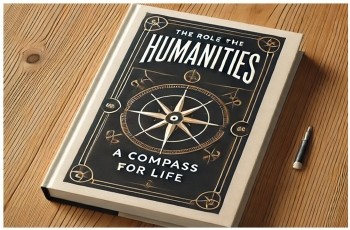シンクタンクからの眼 2022年5月16日
人文学の役割(2)生きる羅針盤 The Role of the Humanities: A Compass for Life

人文学の役割-生きる羅針盤 The Role of the Humanities: A Compass for Life
人文学は、生きる羅針盤である。私たちがどこへ向かうべきか、何を価値あるものとすべきか、その方向性を示してくれるのが人文学だ。人文学とは、社会、歴史、哲学、芸術、文学などを含む人間の思考や文化、価値観を探究する学問であるからだ。現代社会は、急速な技術発展とデータ主義の影響で、効率性や実用性が強調されがちである。しかし、こうした時代だからこそ、人文学の重要性が一層高まっている。人文学とは、単に過去の知識を振り返る学問ではなく、変化し続ける世界の中で人間らしさを保ち、人生の本質を探求するための学問なのだ。
人文学は、人生の哲学である。私たちの人生とは、選択の連続でもあります。自分に合う勉強をし、職業を決め、人間関係を築き、社会的責任を果たす。そのすべての過程において、私たちはそれぞれのいわゆる人生の哲学を持っている(無意識的でも)。そして、その哲学の土台となるのが人文学だ。社会、文化、歴史、哲学、芸術など人文学のさまざまな分野は、『人間はなぜ生きるのか』『どのような人生が意味のあるものなのか』といった問いへの答えを探す旅を支えてくれる。もちろん、人文学を学ばなくても楽しく生きていくことはできる。しかし、より深みのある人生を望むなら、自らの生き方を考えられる人になりたいのなら、人文学を無視することはできない。
特に、理系の人々にとって人文学は必須といえるほど大事だ。テクノロジーは私たちの生活を便利にするが、それが本当に人間にとって有益なのか、どのような影響をもたらすのかを考えるのは、結局、人文学の役割である。人工知能、ビッグデータ、バイオテクノロジーなどの先端技術が発展すればするほど、社会的に責任や倫理的な問題も浮かび上がる。私たちは、サイエンスの発展そのものに満足するのではなく、それが人間にとってどのような意味を持つのかを省察しなければならない。科学者は新しいものを創造するが、その成果の使い方を決めるのは、人文学的な洞察にほかならない。サイエンスが人間を支配するのではなく、人間がサイエンスを正しく活用できるようにすることこそ、人文学が果たすべき重要な役割の一つなのだ。
経営者にとっても、人文学は不可欠である。経営とは、単に利益を追求することではない。人を理解し、組織を運営し、社会的責任を果たすことこそ、経営の本質である。優れた経営者とは、数字だけを見るのではなく、人を見つめることができる人である。人文学を学ばない経営者は、結局のところ普通の経営しかできない。そして、そうした経営には喜びがあっても長続きしない。従業員の心を動かし、顧客と対話し、時代の変化を読み取る力は、人文学的な素養から生まれる。経営とは、単なる効率性の追求ではなく、人間的な経営を実現することなのだ。それは、企業だけでなく、自らの人生を経営することにもつながる。
私たちは、「人文学は実用的ではない」と考えがちである。しかし、真の実用性とは、短期的な有用性にとどまらず、長期的に人々を幸せにするものである。科学技術、経営、政治、芸術など、どの分野においても、人文学がその基礎にないものはない。もし人文学がなければ、人間の精神は迷走し、人生の深い喜びも失われてしまうだろう。人文学を通じて、人を学び、世界を理解し、より良い未来を考えることができる。だからこそ、人文学は単なる学問ではなく、人間が人間らしく生きるための羅針盤であり、哲学であり、さらにはあらゆる分野における発展の根本なのである。
(玉川きょうさい、Ph.D./Prof.)
The Role of the Humanities: A Compass for Life
The humanities serve as a compass for the human spirit. They guide us in determining where we should go and what we should value. Today, where rapid technological advancements and data-driven thinking emphasize efficiency and practicality, the significance of the humanities is greater than ever. The humanities are not merely about reflecting on past knowledge; they are a discipline that helps us maintain our humanity and explore the essence of life in a constantly changing world.
The humanities are a philosophy of life. Life is a series of choices—choosing what to study, deciding on a career, building relationships, and fulfilling social responsibilities. Throughout these processes, we all carry our own philosophies. The foundation of these philosophies lies in the humanities. Fields such as sociology, culture, history, philosophy, and the arts support our journey to answer fundamental questions like, “Why do humans exist?” and “What kind of life holds meaning?” While it is possible to live without studying the humanities, those who seek a deeper, more fulfilling life—those who wish to reflect on their way of living-cannot afford to ignore them.
The humanities are especially crucial for those in the sciences. While technology makes our lives more convenient, it is the role of the humanities to question whether it truly benefits humanity and what kind of impact it has. As advanced technologies such as artificial intelligence, big data, and biotechnology continue to develop, ethical and societal responsibilities also come to the forefront. We must not be content with scientific advancements alone; we must reflect on their significance for humanity. Scientists create new innovations, but it is humanistic insight that determines how those innovations should be used. One of the vital roles of the humanities is to ensure that science serves humanity, rather than allowing science to dictate human life.
For business leaders, the humanities are also indispensable. Management is not just about pursuing profit; it is about understanding people, running organizations, and fulfilling social responsibilities. Great leaders do not focus solely on numbers—they focus on people. Business leaders who lack a background in the humanities can only manage in an ordinary way, and ordinary management does not lead to lasting success. The ability to inspire employees, engage with customers, and read societal changes stems from humanistic education. Management is not just about maximizing efficiency; it is about practicing humane leadership. This concept applies not only to corporate management but also to managing one's own life.
Many people tend to think that the humanities are not practical. However, true practicality is not limited to short-term usefulness—it is something that brings long-term happiness. In every field, whether science, business, politics, or the arts, the humanities serve as a foundation. Without the humanities, the human spirit would become lost, and life’s deeper joys would disappear. Through the humanities, we can understand people, comprehend the world, and envision a better future. That is why the humanities are not just an academic discipline; they are a compass for life, a philosophy, and the foundation for progress in every domain.
(K.S. TAMAGAWA, Ph.D./Prof.)




